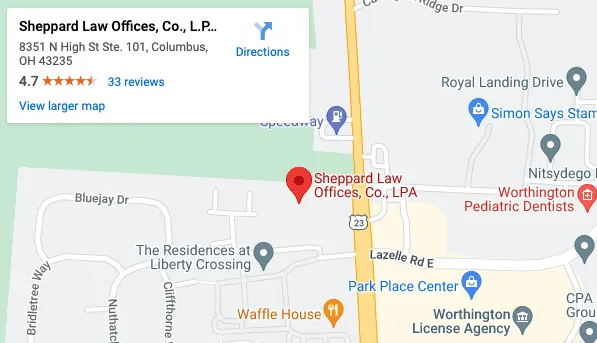Tax Lien

WHAT IS A FEDERAL TAX LIEN?
- Real Estate
- Individual Property
- Car Assets
- Financial Assets
A Tax Lien is when you then fail or refuse to pay the amount on the “Notice and Demand for Payment” in time. The IRS will then file a public document to alert creditors that the government has a legal right to your property. For more information please refer to “Publication 594: The IRS Collection Process”
If you’ve been issued a Tax Lien and are unsure of how to handle it, the professionals at Sheppard Law Offices can help. Our Columbus tax attorneys work with you to determine the most effective way to remove the tax lien and pay off any outstanding debts.
HOW DO I GET RID OF A TAX LIEN?
The best way to get a tax lien removed is by paying your tax debt. The IRS will then release your lien within 30 days after you have paid the tax debt.
A “Discharge” removes the lien from certain property. To determine eligibility please see the Internal Revenue Code (IRC) and Publications such as Publication 783: Instructions on How to Apply for Certificate of Discharge from Federal Tax Lien
“Subordination” does not remove the lien, but it makes it easier to get a loan or mortgage due to the creditors moving ahead of the IRS. Do you want to see if you are eligible for Subordination? Please see the following article, Publication 784: Instructions on How to Apply for a Certificate of Subordination of Federal Tax Lien
A “Withdrawal” will remove the public “Notice of Federal Lien” and will ensure that the IRS is not competing with other creditors to take over your property. With a “Withdrawal” you are still responsible to pay the full amount of the “Notice of Federal Tax Lien”. For eligibility, refer to – Form 12277: Application for the Withdrawal of Filed Form 668(Y), Notice of Federal Tax Lien (Internal Revenue Code Section 6323(j))
According to the Commissioner’s 2011 “Fresh Start Initiative” there are now two additional Withdrawal options. If you’re ready to discuss your options further, give us a call toll-free at (866) 770-4918.

SETTLE YOUR DEBT AND TAX PROBLEMS Today!
Contact Us Now!
TAX
HOW DOES A TAX LIEN AFFECT ME?
- Assets – A lien is attached to all your assets. Even future assets are at risk during the time that you have a tax lien under your name.
- Credit – At the time that the IRS files a “Notice of Federal Tax Lien”, there is a possibility that it will affect any/all credit.
- Business – The lien will attach to the business property and the full rights to the business property, including accounts receivable.
- Bankruptcy – Even if you file for Bankruptcy a tax debt, lien and Notice of Federal Tax Lien may continue after the bankruptcy time is complete.
HOW CAN I AVOID A TAX LIEN?
At Sheppard Law Offices, our Columbus Tax Lawyers are here to help you deal with any existing liens, and steer clear of any additional tax trouble. To avoid a Lien, you need to make sure that you are filing your taxes on time. If you are unable to pay the balance owing, do not ignore the letters from the IRS or correspondence that are sent to you. There are payment options that the IRS offers if you can’t pay the amount in full. These payment options are available to you to help settle any of your debt with the IRS over a select amount of time.
LIEN VS. LEVY
Some people will confuse a lien with a levy. A lien is not a levy. A lien secures the government’s interest in your assets and property when you do not pay your taxes. A Levy, on the other hand, takes your property to pay what you owe.
You need to decide on a payment plan to settle your debt with the IRS or they can levy, seize, and sell any of your property that you own or will own within a certain timeframe.
If you have any tax questions about Tax Lien issues you may come across, please don’t hesitate to Contact the Columbus tax attorneys at Sheppard Law Offices to discuss your particular situation. For your convenience we have tax law offices in Columbus, Newark, and Mount Vernon, Ohio. Call today to schedule your free consultation at (866)770-4918.
Contact Sheppard Law Offices and Kenneth L. Sheppard, Jr. to discuss your particular situation. Call today to schedule your free consultation at (614) 523-3106.

